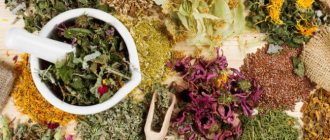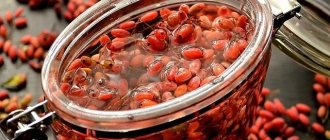Table of contents
- Collection No. 1
- Collection No. 2
- Collection No. 3
- A little about celandine
- For gastritis with low acidity
- Herbal teas for stomach and duodenal ulcers
- Increasing the effectiveness of gastric herbal medicine
Acute gastritis (inflammation of the gastric mucosa) usually begins with food poisoning, poisoning, including alcohol, drugs, and chemicals. It manifests itself as severe pain in the stomach (3–5 days), dyspepsia, and poor general condition. Sometimes inflammation of the stomach can be combined with inflammation in the duodenum - gastroduodenitis. A feature of gastroduodenitis is that the pain is longer lasting (2-3 weeks).
For acute gastritis, it is recommended to fast on the 1st day, thin food in small quantities on the 2nd day, and a gentle diet for 1 month. For food poisoning, strong tea and flaxseed mucus are given as first aid. In case of poisoning with poor-quality products, a herbal collection is used:
Features of herbal medicine
According to gastroenterologists, almost all inhabitants of the globe suffer from temporary digestive disorders, regardless of age, gender and race. However, they do not have diseases of the gastrointestinal tract. Abdominal pain, nausea, heartburn, and a feeling of fullness in the stomach are usually caused by eating fatty or “unusual” foods. If you complain about such symptoms, you should consult a doctor after vacations, holidays, or family celebrations.
Normalization of the gastrointestinal tract usually does not require taking enzymes, antacids and analgesics. Natural remedies - medicinal herbs - cope well with this task. They have a gentle effect on the body, gradually restoring the functioning of the intestines and stomach. They are used only to reduce the severity of symptoms.
Contraindications to herbal medicine include hypersensitivity, pregnancy, lactation, and age under 12 years.
Teas, infusions, decoctions, and herbal mixtures have no effect on the causes of the development of any disease. But the use of medicinal herbs to improve digestion can be an excellent prevention of gastritis, ulcerative lesions, colitis and gastroenteritis.
Herbs that improve digestion
Malfunctions of the gastrointestinal tract occur due to poor nutrition or impaired enzyme synthesis. A sedentary lifestyle, alcohol consumption, and daily stress have a negative impact on digestion. How can you help your stomach?
Buy willow (bark) on our website
Many gastroenterologists advise their patients to drink infusions of medicinal plants. Some herbs have a laxative effect, so they are used for constipation. Other plants, on the contrary, are prescribed for diarrhea. There are also folk remedies for heartburn and heaviness. Don't know which herbs to improve digestion and bowel function are right for you? We have divided them into groups especially for you.
Plants for heartburn and heaviness
Heaviness occurs due to insufficient production of digestive juices and enzymes. As a result, food stays in the stomach for a long time. Heartburn occurs due to increased acidity. Here is a list of digestive herbs that will help solve the problem:
- Celery root prevents acidity and reduces heartburn. It is taken raw, and infusions from the dried root are also prepared.
- Calamus root increases appetite and relieves heartburn. It is used in the complex treatment of gastritis and gastrointestinal ulcers.
- Rosehip root stimulates the production of gastric juice and enzymes. Infusions speed up the digestion process in the stomach; they are used against heaviness, heartburn and gastritis.
- Chamomile flowers stimulate the secretion of the intestines and stomach, relieve spasms and pain. They clear the bile ducts, stimulating digestion. Chamomile is used for inflammatory processes, ulcers and gastritis.
- Celandine reduces the concentration of gastric juice, reducing the symptoms of heartburn and relieving pain from peptic ulcers. The plant is also effective as a remedy for flatulence and diarrhea.
Herbs for intestinal colic
Pain and spasms of the intestines are usually the result of an infectious disease, poisoning or poor patency of the digestive canal, which can be caused by a sharp contraction of the intestinal muscles. Colic can be so strong that it knocks you out of your usual rhythm. The following medicinal plants will help cope with them:
- Alder cones are recommended to be consumed in a course for chronic colitis and irregular bowel movements.
- Saxifraga soothes the intestines, improves fluid absorption, and normalizes stool. The root of the plant is used to treat the digestive system.
- Cinquefoil regulates contractions of the intestinal muscles, reduces the frequency and strength of spasms. Infusions and alcohol tinctures are prepared from the rhizomes of the plant.
Important!
If intestinal colic is accompanied by irregular bowel movements, then along with infusions for spasms, you should take medications for constipation.
Medicinal herbs for diarrhea
In cases of poisoning and infectious diseases, diarrhea is common. It can also be caused by intestinal dysfunction and alcohol abuse. Not sure which herbs will help stop diarrhea? Here is the list:
- St. John's wort prevents dehydration and stops diarrhea and vomiting. The herb is often used to treat poisoning.
- Oak bark stimulates digestive processes, removes toxins and poisons in case of poisoning, and helps get rid of abdominal pain and diarrhea.
- Willow bark , due to its astringent effect, normalizes stool. It is used in the form of decoctions for diarrhea.
- Yarrow normalizes metabolic processes, prevents the formation of gases, and stimulates the absorption of water in the intestines. The herb is suitable for the treatment of dysentery, food poisoning, gastritis.
- Bearberry leaves have a strengthening effect and reduce intestinal spasms.
Plants that help with constipation
The most common causes of constipation are poor diet, spasms of the digestive tract and intestinal hyperfunction (increased water absorption). Do you want to get rid of constipation? Then use the following herbs for digestion:
- Plum fruits are rich in fiber, which is necessary for the proper functioning of the gastrointestinal tract. Prunes have a persistent laxative effect.
- Centaury helps the body absorb nutrients as much as possible, stimulates the production of intestinal juices and enzymes, and helps cleanse the intestines.
- Valerian root reduces the formation of gases and softens stool.
- Senna ensures normal intestinal motility and acts as a mild laxative.
- Buckthorn bark stimulates the smooth muscles of the intestinal tract and reduces pain during bowel movements.
Interesting fact
Centaury began to be used to cleanse the intestines in Ancient Greece, and buckthorn bark - in Ancient China.
The most effective herbs and their properties
In folk medicine, many roots, seeds and leaves are used for gastrointestinal problems. But since their effectiveness has not been confirmed by any research, we will consider herbs from the Great Encyclopedic Dictionary of Medicinal Plants.
It has been established that the following herbs have the most beneficial effect on the digestion and absorption of food:
- Rosemary.
- Melissa.
- Mint.
- Basil.
- Parsley.
- Marjoram.
- Sage.
- Thyme.
- Oregano.
- Chamomile.
Their beneficial properties are determined by the action of biologically active substances from the chemical composition. It is represented by phytoncides, organic acids, flavonoids, vitamins, mineral salts and other useful compounds.
When combined, they exhibit the following therapeutic effects:
- restorative;
- carminative;
- secretolytic;
- gastroprotective;
- enveloping;
- anti-inflammatory;
- painkiller;
- antispasmodic;
- astringent;
- antimicrobial;
- wound healing;
- hemostatic.
It is enough to drink 1-2 cups of aromatic tea or decoction to eliminate the stagnation of the food bolus and stimulate its proper movement through the gastrointestinal tract. Now proteins, fats, carbohydrates are fully broken down, absorbed into the bloodstream and distributed to target organs.
What plants are taken for gastrointestinal diseases?
Herbs that have a calming and anti-inflammatory effect are used to treat gastrointestinal disorders. They stimulate the production of enzymes and gastric juice, due to which the processes of digestion and assimilation of food are normalized.
- Yarrow. It grows throughout almost the entire territory of Russia and is used to treat diseases of the gastrointestinal tract. It contains resins, bitters, essential oils and other components that stimulate the production of digestive enzymes, destroy pathogenic microorganisms, relieve pain and other symptoms of digestive disorders.
- Milk thistle. An annual plant that is considered one of the most effective remedies for treating ulcers, gastritis, and liver diseases. Milk thistle contains active components that protect organ cells from destruction and stimulate the gastrointestinal tract and biliary system.
- Fennel. The fruits of sweet dill are a carminative and laxative known in folk medicine. It is used for constipation caused by various factors, as well as for bloating and flatulence. Fennel normalizes the processes of food digestion and the flow of bile, and also has an antispasmodic and analgesic effect.
- Pharmaceutical camomile. The plant has a pronounced anti-inflammatory effect, therefore it is used in the complex therapy of colitis, gastritis and other diseases associated with inflammatory processes.
- Calamus root. Recipes containing calamus root are used to treat heartburn due to disorders of the digestive system, as well as ulcers and gastritis. In addition, it stimulates appetite and eliminates abdominal discomfort.
- Flax seeds. The drug is used to treat diseases of the pancreas, duodenum and liver. Decoctions and infusions of flaxseed envelop the mucous membrane, soothe it and protect it from negative effects, also relieve inflammation and relieve unpleasant symptoms.
Plants that help with gastrointestinal diseases also include mint, lemon balm, calendula, and St. John's wort.
Rosemary
Rosemary essential oil is rich in α-pinene, cineole, borneol and other substances with a general healing effect. In gastroenterology, it is used for intestinal inflammation and dyspeptic disorders. Under its influence, smooth muscles relax, helping to relieve “hunger” pain and unpleasant heaviness after eating. Rosemary is also used to prevent the spread of Helicobacter pylori infection, leading to gastritis.
To prepare aromatic tea, steep a couple of fresh or dry twigs in a glass of boiling water for about an hour. You can simply add it to salads made from fresh vegetables, seasoned with a drop of vegetable oil.
Melissa
One of the best teas for normalizing the functioning of the intestines and stomach is made from lemon balm. It has many useful properties - analgesic, anti-inflammatory, antiseptic, blood purifying. Melissa helps with stomach pain, a feeling of fullness, heaviness, and perfectly relieves attacks of nausea. If, due to stagnation of food, a putrefactive process begins to develop, then it will not allow pathogenic bacteria to multiply. Melissa will help improve the functioning of the gastrointestinal tract for those who become upset under stress, due to acute experiences of conflict situations.
Tea is brewed by adding 2 tsp. dry herbs or 5 fresh leaves in a glass of boiling water. Drinking such tasty and healthy tea will improve not only digestive processes, but also calm you down and improve your sleep.
Mint
If you are looking for a way to improve gastric motility, then you need to pay attention to mint. It helps normalize the secretion of bile, which is necessary for the proper breakdown of foods and the absorption of nutrients. It has long been proven that mint has a powerful antibacterial effect. This means that those who regularly drink tea based on it are not afraid of the gastritis pathogen Helicobacter Pylori.
The infusion is prepared simply - 1 tsp. dry leaves are poured into a glass of boiling water and drunk throughout the day. But it is worth considering the pronounced relaxing effect of tea. For people who drive a car or perform work that requires a special speed of psychomotor reactions, it is better to use it before bed.
Herbs for the intestines
Intestinal diseases can be treated with herbs only after a full examination - sometimes their causes are neoplasms, internal bleeding and other pathologies that require surgical intervention.
For constipation
Constipation is a condition in which there is no bowel movement for 2 or more days. It not only causes serious discomfort, but can also cause intoxication and other complications.
- Toadflax. Pour a teaspoon of herb into a glass of boiling water, leave for half an hour, then filter and take 250 ml before bed.
- Senna. Steam the dried leaves of the plant (1 dessert spoon) with a glass of hot water and leave for 30 minutes. After this, strain and drink 100 ml in the evening.
Herbs used to treat constipation have a laxative effect, so it is best to stay at home while taking them.
For diarrhea
Plants that help with diarrhea have an astringent effect - these include oak bark, knotweed, blueberry, etc.
- Oak bark. Take a teaspoon of crushed raw materials, steam 500 ml of water, leave for 8 hours. Strain, divide the broth into 2 doses and drink them throughout the day.
- Highlander. Pour 3 tablespoons of the plant root into a glass of boiling water, leave for 15 minutes on low heat, filter and add boiled water to a volume of 250 ml. Drink a tablespoon 20 minutes before meals.
- Blueberry. Dried berries (1 tablespoon) pour 400 ml of water, add 1 teaspoon of starch and cook jelly. It can be consumed in unlimited quantities until the condition improves.
You should not treat diarrhea caused by food poisoning with herbs - in such cases, you need drugs that will destroy pathogenic microorganisms.
For flatulence
Flatulence causes excess gases that accumulate in the intestines when digestive functions are disrupted. You can get rid of it with mint, fennel, and wormwood.
- Fennel. Pour 200 ml of boiling water over a teaspoon of fennel, leave for half an hour, drink half a glass three times a day 30 minutes before meals.
- Sagebrush. Take a tablespoon of dry raw materials, steam with a glass of boiling water and leave for 12 hours. Strain the liquid and drink 100 ml three times a day.
Wormwood and other products containing bitterness are not very pleasant to the taste, so it is better to add honey to them.
To cleanse the intestines
It is recommended to cleanse the intestines of waste and toxins several times a year. The procedure helps normalize the gastrointestinal tract and improve overall well-being. The following plants are used for this purpose:
- high fiber psyllium seeds;
- dandelion, which has an antioxidant effect;
- rhubarb – has a laxative effect and activates metabolic processes;
- Nettle is a herb with a tonic effect.
The recipe for preparing cleansers is similar - pour a tablespoon of dry leaves into a glass of boiling water and leave until it cools completely. Take 100 ml three times a day.
For colitis
Colitis is an inflammatory disease that is accompanied by discomfort and bowel dysfunction. To treat it, bergenia, cuff, fir oil, and plantain are used.
- Cuff. Brew 3 tablespoons of raw materials with a glass of boiling water, put on fire, bring to a boil and leave for 3 hours. Drink a quarter glass before meals until relief occurs.
- Plantain. To treat colitis, rinse the plantain, mince it and squeeze out the juice. You need to drink it one tablespoon before meals three times a day.
For chronic colitis, treatment should be long-term - at least several weeks, and folk remedies should be combined with medications.
Basil
Basil has been used for centuries in Ayurveda, the traditional system of Indian folk medicine. And the residents of this country know firsthand about digestive disorders. The dried leaves are brewed with boiling water like regular tea and taken for cramps and pain.
Juice from fresh leaves, which is easy to prepare yourself, perfectly normalizes digestion.
After using only 1 tsp. Increased gas formation is reduced, bloating disappears, the gastric mucosa is reliably protected from aggressive hydrochloric acid. A mixture of 1 tsp works even better. juice and a couple of pinches of grated ginger root, to which black pepper is added on the tip of a knife.
Parsley
To improve the functioning of the intestines and stomach, you should use traditional parsley, which many consider only a spice. In fact, it is a medicinal plant with antibacterial effects. According to research results, parsley prevents the introduction of pathogenic microorganisms Helicobacter Pylori into the gastrointestinal tract. It also helps to cope with the painful symptoms of poisoning from spoiled food.
Dry parsley can be brewed as tea, but the resulting drink will have a very specific taste. It is better to eat it fresh, add it to pureed soups, side dishes, salads, and sprinkle sandwiches with chopped herbs.
Prevention
To prevent gastrointestinal disorders, you should adhere to proper nutrition, stop smoking and drinking alcohol, reduce stress and engage in light physical activity.
As a preventative measure, you can use decoctions with rose hips, strawberry leaves, ginger, chamomile and lemon balm. If there are no contraindications, they can be drunk without restrictions instead of tea and coffee.
The most effective medicinal plants that are used to treat diseases of the digestive tract, simple recipes for decoctions and infusions, treatment rules.
Marjoram
Marjoram is not only a popular spice found in various seasonings, but also an effective herb for digestion. Its essential oil smells pleasantly of cardamom and thyme at the same time, has a subtle and sweet, sharp and spicy taste. Marjoram is indicated for flatulence that develops after eating “heavy” food. It promotes the collapse of gas bubbles, and then their natural removal from the body. This helps to get rid of the extremely uncomfortable feeling of abdominal distension, as well as belching and constipation.
A pinch of dry marjoram is added when brewing regular black or green tea. They are sprinkled on ready-made dishes and simply chewed while eating. Because of its fat-burning properties, those who are overweight should definitely include marjoram in their diet.
Sage
In our country, sage is used to ward off colds and treat bronchitis and sore throats. The plant helps strengthen the immune system and clear the airways of thick mucus. But residents of European countries, when asked what tea to drink to improve digestion, will always answer - with sage. It is characterized by a peculiar slight bitterness due to the high concentration of essential oil. It helps ease the passage of gases, eliminate intestinal spasms and gastric disorders, relieves inflammation and strengthens local defenses, and destroys Helicobacter Pylori.
Fragrant, tasty and healthy tea is prepared by brewing 1 teaspoon of dry leaves in a glass of boiling water. After a quarter of an hour, filter the infusion and drink 100 ml with meals. In European countries, sage is added to prepared dishes and baked goods.
Herbs for the pancreas
Diseases of the pancreas are dangerous because they can cause necrosis or scarring of tissue, as a result of which the functioning of the entire body deteriorates. Symptoms of such pathologies include pain in the hypochondrium, heaviness in the abdomen, bloating and constant nausea.
For pancreatitis
Pancreatitis is accompanied by increased production of enzymes, due to which the organ begins to digest its own tissues. To treat pathology, birch leaves, flaxseed, and golden mustache are used.
- Flax-seed. Pour a glass of boiling water over a tablespoon of flaxseed and leave until the seeds swell. You should drink the infusion throughout the day and eat the rest.
- Golden mustache. Take 3 leaves of the plant, add a liter of water and simmer over low heat for 15 minutes. Close the lid, leave for 8 hours, strain and drink a glass 3-4 times a day.
- Birch leaves. Finely chop the raw materials, add a liter of water, put on low heat and boil for 5 minutes. Cool slightly, filter and take 100 ml three times a day.
In case of acute pancreatitis, you must stop eating for 1-2 days, then take decoctions and follow a strict diet.
For inflammation of the pancreas
Inflammatory processes in pancreatic tissues require immediate comprehensive treatment. The therapy can include flaxseed, yarrow, peppermint, and chamomile.
- Peppermint. Take 5 g of raw material, pour a glass of boiling water and leave covered for 15-20 minutes. Drink in small sips throughout the day.
- Yarrow. Brew 6 g of dry leaves with hot water (250 ml), leave for 15 minutes, strain and drink 150 ml 4-5 times a day.
- Chamomile. Steam a tablespoon of dried plant with a glass of boiling water, leave for 30 minutes, take a quarter glass three times a day.
If your condition worsens, you should immediately consult a doctor. Inflammatory processes lead to tissue necrosis, which can threaten the patient’s life.
Thyme
Thyme is perhaps the most fragrant plant growing in our country. Many people know it as thyme. It has been established that most of the medicinal properties of thyme are determined by thymol, carvacrol, bitters, gums, and organic pigments. An infusion prepared on its basis has a powerful antiseptic and anti-inflammatory effect, so it will be useful for people suffering from mild stomach pain after eating fatty foods.
Like mint, thyme is very calming and relaxing, so drinking tea (1 teaspoon per glass of boiling water) is better before bed. But fresh it can be eaten throughout the day to normalize digestion, adding it to marinades, sauces, and side dishes.
Oregano
Oregano or oregano is good for the stomach. Its chemical composition is almost identical to marjoram, therefore the scope of application for medical purposes is the same. Oregano is characterized by antimicrobial, antiseptic, antiviral and anthelmintic effects. Therefore, the herb is especially in demand for digestive disorders caused by intoxication, poisoning, helminthiasis, and improper and unbalanced nutrition.
Doctors recommend using oregano for people whose diet contains a lot of processed foods, smoked foods, coffee, and alcohol.
Chopped oregano can be sprinkled on prepared dishes. And also brew fragrant tea by infusing 1 tsp. dry herbs in a glass of boiling water for 15 minutes. One cup of drink is enough to eliminate all symptoms of flatulence, stool disorders, and dyspepsia.
Chamomile
Chamomile tea has a bitter, specific taste due to the high content of bitterness and chamazulene in the flowers. It copes well with painful cramps and a feeling of heaviness after eating. Due to its antiseptic and antimicrobial effects, chamomile is used for prophylactic purposes - to prevent the development of Helicobacter pylori infection. It is no less useful for the intestines.
Some digestive disorders are associated with a gradual decrease in the population of bifidobacteria. Taking chamomile infusion stimulates their growth and active reproduction, restoring the optimal balance of microflora.
To prepare the drink 1 tsp. dry plant material is poured with a glass of boiling water and left for half an hour. Take half a glass after meals until you feel better.
Herbal infusions
Pharmacies sell a variety of herbal teas to improve digestion. But all of them are intended primarily for the complex treatment of diseases and have a number of contraindications.
For rare problems with the gastrointestinal tract, it is better to prepare a healthy herbal mixture yourself, and then brew fragrant tea:
- Antispasmodic, analgesic . Pour 1 tbsp into a thermos. l. mint, calendula, marjoram, pour 2 cups of boiling water, filter after an hour and take 5 tbsp. l. every 2 hours until you feel better.
- Carminative - with bloating, seething and rumbling . Pour 1 tbsp into a container. l. parsley, sweet dill and thyme, pour 3 glasses of boiling water, leave for 2 hours, filter, take half a glass up to three times a day.
- Antidyspeptic for heartburn, sour belching, heaviness after eating . Place 1 tbsp in an enamel container. l. sage, oregano, rosemary, pour 2 cups of boiling water, filter after an hour, take 100 ml twice a day.
- From rapid saturation, stagnation of food . 0.5 tsp. fennel, mint, licorice, pour a glass of boiling water, leave covered for 2 hours. Cool, filter, take 3 tbsp. l. while eating.
Calamus, St. John's wort, plantain, licorice, tansy are used as additional components to enhance peristalsis and eliminate stomach upsets. They are taken in the same proportions as the base plants, increasing the volume of water accordingly.
When is the best time to consult a specialist?
Pathologies of the digestive tract should be treated only after an accurate diagnosis has been made. Some diseases have common symptoms, so it is impossible to determine the problem on your own. Additionally, herbs should not be taken in the following situations:
- for acute symptoms, including severe pain, frequent vomiting and diarrhea, especially with blood; during pregnancy and lactation;
- in the presence of severe chronic diseases - cardiovascular disorders, renal and hepatic dysfunctions, central nervous system disorders.
Self-medication can seriously harm the patient’s condition, so before using traditional recipes you should consult a specialist.
Herbs for the intestines for constipation
Eating fatty foods rich in simple “empty” carbohydrates often leads to problems with bowel movements.
In official medicine, the following medicinal plants are used to eliminate them:
- Buckthorn.
- Senna.
- Fennel.
- Dill.
- Zhoster.
- Three-leaf watch.
- Yarrow.
To enhance intestinal peristalsis, but not provoke diarrhea, the infusion is prepared at the rate of 1 tsp. per glass of boiling water. Take 100 ml (half a glass) of the fragrant drink three times a day.
Herbs and berries for the stomach
For pathologies of the digestive tract, you can use not only medicinal herbs, but also berries. They improve the functioning of the digestive tract and contain a large amount of vitamins that have an immunomodulatory effect and promote rapid recovery.
For abdominal pain
Chamomile, mint, yarrow, blueberries and gooseberries have a calming and analgesic effect.
- Chamomile. Brew a dessert spoon of raw material with 1.5 cups of boiling water, then cool. Drink 150 ml before meals throughout the day.
- Yarrow. Dried herb (1 tbsp), steam for half an hour with a glass of boiling water, then filter and take 100 ml three times a day.
These recipes can be used for mild stomach or intestinal cramps. Severe pain requires immediate medical attention.
For gastritis
Gastritis is accompanied by heartburn, bloating and nausea, which occurs on an empty stomach. To treat the disease, algae, centaury, mint, strawberry leaves, and calamus are used.
- Watch. Pour two tablespoons of dried plant into a glass of boiling water and leave in a steam bath for 15 minutes. Drink a third of a glass 30 minutes before meals.
- Calamus root. If gastritis is accompanied by heartburn, you can take a pinch of dried and ground root, swallow it, and then add plenty of water.
- Herbal collection. Mix a tablespoon of centaury herb, 3 tablespoons of watch, 2 peppermint, then steam a teaspoon of the collection with 250 ml of boiling water. Leave for 5 minutes, strain, drink in small sips throughout the day.
When treating gastritis, it should be taken into account that the disease may be accompanied by low or high acidity, which determines the treatment regimen.
With increased acidity
With increased production of hydrochloric acid, patients experience discomfort in the stomach, heartburn and frequent belching. These symptoms can be relieved with calendula decoction, aloe juice, and cinquefoil infusions.
- Aloe. Squeeze the juice from the fleshy leaves of old (at least 3 years old) aloe and take 2 teaspoons before meals. The product must be fresh, so you cannot prepare it for future use.
- Bloodroot. Take 50 g of cinquefoil roots, pour in 0.5 liters of good vodka, leave for 3 weeks in a dark place. Drink 20 drops before each meal, dissolving them in water.
Herbs that are used for excessive hydrochloric acid production should not be taken for low acidity.
When taking antibiotics
Antibiotics disrupt the microflora of the stomach and intestines, which provokes a condition called dysbiosis. Its symptoms are bloating, pain, defecation problems and loss of appetite.
- Dill seeds. Pour four teaspoons of dill seeds into a glass of boiling water, leave for 2 hours, then drink a tablespoon at least 6 times a day.
- Burnet. Measure 200 g of plant root per glass of boiling water and simmer over low heat for 20 minutes. Take a teaspoon 6 times a day.
- Plantain and calamus. Take the leaves of the plant and calamus root in equal parts, steam with a glass of hot water, and leave for half an hour. Drink 50 ml three times a day for at least a week.
Treatment of dysbiosis should be long-term, at least a week, and it is important to consume as many fermented milk products as possible, which promote the growth of beneficial bacteria.
The latest achievements of herbal medicine
It is not without reason that they say that the new is the well-forgotten old. Increasingly, modern herbal medicine uses herbs that have been used in Tibetan medicine for centuries to improve digestion:
- pomegranate tree, which promotes food digestion;
- sea buckthorn, which helps protect the gastric mucosa;
- Prince of Siberia, relieving heaviness and cramps after eating;
- six-petalled clematis, which helps stop fermentation processes;
- Adams rhododendron, which increases the production of gastric juice;
- black pepper, which accelerates the breakdown of food.
Scientists are studying their chemical composition to find out which organic compounds are especially beneficial for organs involved in digestion. It is quite possible that new, effective herbal preparations and herbal remedies will soon appear on pharmacy shelves.
Recommendations for use
To effectively treat diseases of the gastrointestinal tract, it is necessary to comply with certain treatment conditions. Herbs for treating the stomach are used in the form of decoctions and infusions, and when taking it, it is important to strictly follow the dosage. Treatment begins with a minimum dose, after which it is gradually increased.
Recipes using medicinal herbs are natural remedies, but therapy must be approached responsibly. They have contraindications and side effects that should be considered before treatment.
Therapy must be combined with proper nutrition - exclude fried, fatty and spicy foods, alcohol, carbonated drinks and other foods that worsen the gastrointestinal tract from the diet.
Sources
- “Tibetan Zhor” is a new collection of recipes. Tib. people's publishing house. - Lhasa, 1975. P.69-70.
- Pozdneev A.M. Textbook of Tibetan medicine / Trans. from gib. and Mong. – St. Petersburg; B.I., 1908. – T.1-2. -425 s.
- A systematic review of research into the therapeutic effects of Matricaria recuitta (chamomile). Miraj S., Alesaeidi S.
- Medicinal plant materials and herbal medicines used to improve digestion. Analysis of the assortment of this group of drugs in pharmacies in the Irkutsk region. Kuular A.M., Lysenko A.Yu.
- Vidal: DIRECTORY OF MEDICINES. Dill fruit (Anethi graveolentis fructus).








